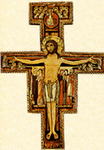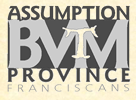
St. Francis of Assisi composed the famous Italian poem, Canticle of the Creatures in the 13th century. He was apparently suffering from an eye affliction and could no longer enjoy what he extolled. Nevertheless, taking his cue from Psalm 148 and Daniel 3 (the Canticle of the Three Youths), he praises God for all created things. Later on he would add his praises to God for those who bear infirmity and who forgive; likewise, toward the end of his life, he praised God for "Sister Death".
He audaciously calls creatures "brother" and "sister." For Francis, this is not sentimentality. Rather, this is a declaration of faith in God who creates and who re-creates fallen nature -- and especially humanity -- in Jesus Christ! In Romans 8:18-23 the Apostle Paul explains to the Christian Church the redeeming work of Christ for all creation. In fact, all creation groans in labor pains for the revelation of the children of God (humanity restored in Christ)!
Furthermore, we read in 2 Corinthians 5:17 and are reminded that all who are in Jesus Christ are a new creation. The Book of Revelation teaches us that Jesus Christ brings about a "new heaven and a new earth" (21:1) and that he promises to make all things new (21:5).
These texts echo the Old Testament prophecies from the Book of Isaiah about a new creation (65:17-18), which like Revelation promises fulfillment by the Lord. The writings of Isaiah also promise restoration of creation (2:1-5 and 11:6-9).
As Christians we proclaim that this has occurred because of Jesus Christ and through him! In fact, it is the mystery into which we are baptized, sealed with the Holy Spirit in Confirmation/Chrismation and in which we participate in the Holy Eucharist and renewed in the Sacrament of Reconciliation. That which has already happened is being fulfilled in the life of the believer and in the life of the community of faith, the Church!
This was St. Francis' vision. God restoring all things in and through Christ (cf. Colossians 1). Now, you might ask, all very well and good. But, what has that got to do with Lent? Good question!
Actually, a lot! Lent is the time of the Church year, a privileged time at that, in which we undergo the sacred journey of a retreat together. As this blog has stated previously, it is a time of change of attitude. About everything . . . including our relationship with the earth!

Scientists revealed a new map on Thursday (14 February 2008) that shows marine ecosystems around the world that have been affected by human activities. High impact areas are shown in red, followed by dark orange, light orange, yellow, green and blue, which signals low impact. (aol.com, Friday 15 February 2008)
Before I am dismissed as a "tree hugging Franciscan" by some -- please note, this is about God's Earth of which we are inhabitants, but certainly NOT owners! As Franciscan friars, a significant part of our concern for proclaiming the Gospel is justice, peace and the integrity of creation. It is not some "liberal" or "conservative" propoganda. This is really very Gospel-centered and Gospel-oriented.
The map above gives a pretty good (computer-generated) indication of the status of our oceans -- what is healthy; what is unhealthy; what needs vast improvement; what is critical. While some may dismiss the issues of "global warming" and the like (I've heard that brought up more than once here in frigid Wisconsin!), nevertheless, we need to check our attitudes toward the earth.
Are we aware of the fishing crisis? Of the crisis regarding the amount of cargo that spill from ocean-going freighters into the seas? Of the "algae blooms" in both fresh-water systems and the devastation to coral reefs and other ecosystems in the oceans, especially those relatively close to our shorelnes?
This is not a trivial addendum to the Gospel nor to living and proclaiming the Gospel of Jesus. Rather, it is a matter of our Christian integrity. If the fishing stocks are depleted, for example, what will millions of people have to eat? Not to mention the disrupted ecosystems in the ocean and their effects upon human habitation and survival.
So, perhaps a good reflection for us this Lent is our common -- and individual -- attitude toward the earth, especially the "precious and chaste" gift of "Sister Water" (the words in quotation marks are those of St. Francis of Assisi in his Canticle).
What is my attitude toward this vital gift of the "blue planet", as it is called? How do I praise God, like the psalmists, St. Francis of Assisi and countless believers, for water? Do I respect this gift? Do I remember to thank God for every sip of water and every use of it I make?
Praised be You, my Lord, through Sister Water, which is very useful and humble and precious and chaste. from the Canticle of the Creatures by St. Francis of Assisi
 A lot of times folks who are serious about engaging Lent find themselves in a real struggle. If they thought that the works of prayer, fasting and almsgiving would be easy, or, if they thought that it might be a good opportunity to practice some kind of pious "diet", I find they are often very mistaken!
A lot of times folks who are serious about engaging Lent find themselves in a real struggle. If they thought that the works of prayer, fasting and almsgiving would be easy, or, if they thought that it might be a good opportunity to practice some kind of pious "diet", I find they are often very mistaken! 






